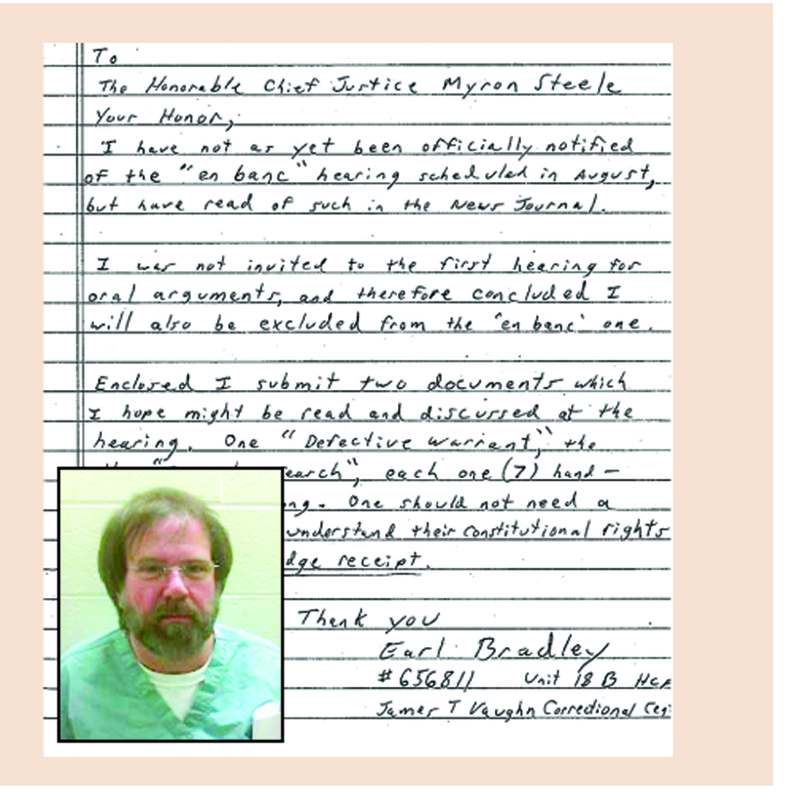Since his arrest in December 2009, convicted pedophile Earl Bradley has said very little in public – until now.
In a July 19 letter from his cell at James T. Vaughn Correctional Center in Smyrna to the Delaware Supreme Court, Bradley maintains, as his defense has argued all along, that his arrest was the result of an illegal search by Delaware State Police.
The search of Bradley’s BayBees Pediatrics offices was based on a search warrant that Bradley says was fatally flawed. Police who searched the offices retrieved medical files of eight patients. Besides paper files, police also netted computers and digital media files. When police viewed one of the digital files, it showed video of Bradley sexually assaulting a patient. Police then sought and obtained a second warrant looking for evidence of child pornography.
Since the beginning of Bradley’s legal battle, his defense team has tried to have this evidence suppressed, saying it was obtained through an illegal search.
According to a court clerk, Bradley's letter was forwarded to his attorneys, and it is now up to them to decide what what to do with it.
In his cover letter to Chief Justice Myron Steele, Bradley said he hoped his letter would be read and discussed at the court’s upcoming Aug. 15 oral arguments of Bradley’s conviction appeal. Bradley wrote he was not invited to a June 13 oral argument heard by a three-justice panel, nor to the upcoming arguments in front of the entire five-member court.
Bradley began his 15-page handwritten letter by saying the search warrant that led to his arrest was “constructed and executed in a manner so blatantly outrageous that it simultaneously assaults multiple principles of the Fourth Amendment.”
He said the warrant did not establish probable cause and lacked details about what police were looking for. Bradley said the warrant failed to articulate how or why the items were sought.
“The warrant is so strongly based on speculation and inference that it becomes hard to find even a basic premise for an anchor. Nothing is more basic than a need for clarification of who the alleged victims are and what specific crimes are they alleged victims of,” Bradley said.
He said no witnesses expressed any connection between the eight medical files police were originally looking for and using a computer to commit a crime. Bradley said police acted on suspicion, not probable cause.
“Only facts related to probable cause and after the proper demonstration of valid nexus to a crime are legal targets,” he said.
Bradley said the search violated his privacy rights and the privacy rights of his patients, because those children’s medical files were seized without the consent of a parent or guardian, with no proof the files are connected to a crime.
Bradley then goes into the search of his computer files, where he begins by blasting Det. James Spillan of the Delaware State Police, who viewed the computer files seized from BayBees.
“Defense briefs have already emphasized the outrageous truth that Spillan did not know or use the eight children’s names in the search for their records. In the context of this case, such an oversight defies common sense,” Bradley said. "More important is the fact that Spillan had no specific identifying information on the eight children, none whatsoever.”
He said while Spillan’s not having the names was bad enough, his not having any criteria to limit or complete his search was offensive to the law. Bradley said the medical file Spillan found showing Bradley sexually assaulting a patient was obscure and was given no relevance in the warrant. Bradley said the file had also been deleted.
“No medical practice elects to keep records in a deleted form,” he said. “A medical record has an implied endorsement of the physician who keeps this record.”
Bradley said deletion of the file does not in itself establish criminal intent to conceal. He said the warrant did not provide probable cause for and did not approve a wholesale removal of digital equipment and media.
In his conclusion, Bradley said the case could spawn a book called “A dozen ways to assault the Fourth Amendment.”
Bradley is currently serving 14 life sentences and 184 years in prison on 24 counts of rape, assault and sexual exploitation involving 86 children.
Jason Miller, spokesman for the Department of Justice, said the Attorney General's Office had no comment on the letter. Miller said it is unusual for a defendant to attempt to communicate directly with a judge.
Bradley's attorney, Robert Goff of the Public Defender's Office, did not respond for comment.
Ryan Mavity covers Milton and the court system. He is married to Rachel Swick Mavity and has two kids, Alex and Jane. Ryan started with the Cape Gazette all the way back in February 2007, previously covering the City of Rehoboth Beach. A native of Easton, Md. and graduate of Towson University, Ryan enjoys watching the Baltimore Ravens, Washington Capitals and Baltimore Orioles in his spare time.























































